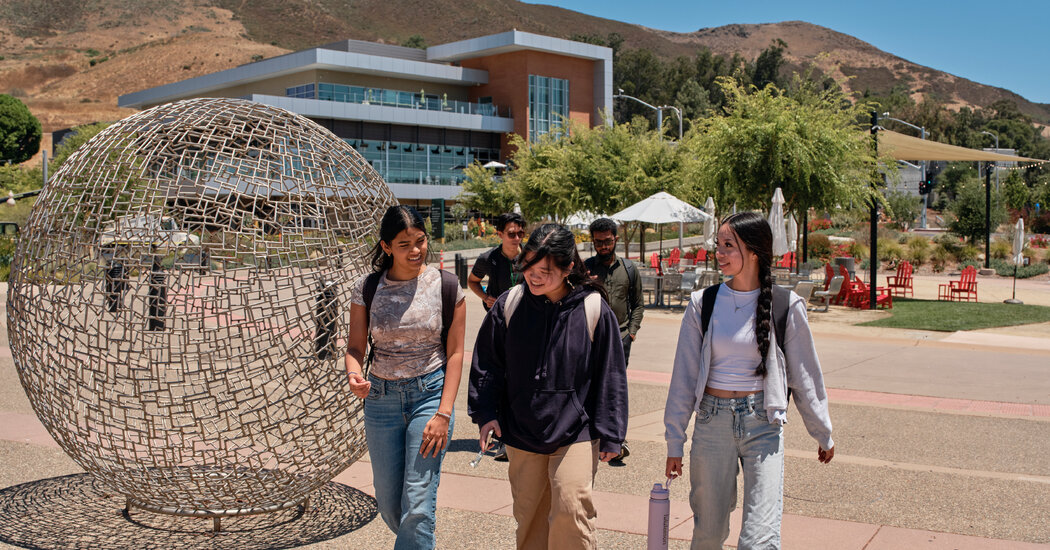California State University (Cal State), the largest university system in the United States, has embarked on an ambitious initiative to integrate artificial intelligence (AI) into its educational framework. This effort aims to position Cal State as the nation’s first and largest AI-empowered university, leveraging partnerships with leading tech companies such as Amazon, OpenAI, and Nvidia.
The initiative is driven by the need to equip students with the skills required for an increasingly AI-driven job market. With over 460,000 students across 22 campuses, Cal State is focusing on making generative AI tools accessible to its academic community, including students and faculty.
One of the key components of this initiative is the introduction of AI training programs, such as the recent AI Camp held at California Polytechnic State University (Cal Poly). This five-day program, powered by Amazon Web Services (AWS), provided students with hands-on experience using Amazon Bedrock, a platform for building AI applications. Participants engaged in various activities, including assignments on AWS Jam, a training app designed to help students practice AI skills.
As part of its strategy, Cal State has committed $16.9 million to OpenAI for the deployment of ChatGPT Edu, a tailored version of the AI chatbot for educational purposes. This rollout is touted as the largest of its kind, aiming to provide AI resources to over half a million students and staff across the university system.
The collaboration with tech giants reflects a broader trend in higher education, where universities are increasingly partnering with industry leaders to enhance curricula and provide students with relevant skills. Kim Majerus, Vice President for Global Education at AWS, emphasized the importance of developing problem-solving and strategic thinking skills, in addition to technical expertise.
Despite the potential benefits, the initiative has sparked debate among faculty and experts regarding the implications of integrating AI into education. Critics argue that the involvement of tech companies in shaping educational content raises concerns about the quality and rigor of AI education. Some faculty members have expressed apprehension that the focus on AI tools may undermine critical thinking skills among students.
Olivia Guest and Iris van Rooij, computational cognitive scientists, have cautioned against the rapid adoption of AI in academia without adequate scrutiny. They assert that universities should prioritize fostering critical thinking rather than uncritically following industry trends.
Cal State’s initiative was partly prompted by feedback from local tech companies, which indicated a skills gap among graduates in the field of AI. Edmund Clark, Cal State’s Chief Information Officer, noted that these companies expressed concern over the university’s ability to prepare students for the evolving workforce.
In addition to the partnership with OpenAI, Cal State has also collaborated with other major organizations. For instance, California Community Colleges recently announced a partnership with Google to provide AI tools and training to 2.1 million students and faculty members. Microsoft has also pledged significant funding to support AI education in schools and community colleges.
While these partnerships aim to enhance educational opportunities, they also raise ethical questions about the commercialization of education. Critics have argued that the reliance on tech companies for educational resources may lead to a commodification of learning, where the primary focus shifts from student development to corporate interests.
Amid these discussions, Cal State is actively working to address concerns related to AI usage among students. Faculty senates at several campuses have passed resolutions urging the university to consider the implications of AI tools on academic integrity, particularly regarding issues of cheating and misinformation.
As part of its AI initiative, Cal State has established an AI committee comprising representatives from various tech companies to identify the skills needed in the job market and enhance students’ career prospects. This collaborative approach aims to ensure that the educational programs align with industry demands.
The AI Camp at Cal Poly exemplifies the university’s commitment to providing practical experience in AI. Students from diverse academic backgrounds participated in projects aimed at solving real-world challenges, such as improving campus administration processes. This hands-on approach is intended to prepare students for careers that increasingly involve AI technologies.
Throughout the camp, students received insights from industry professionals about the potential applications of AI in various fields, including business and healthcare. However, they were also cautioned about the risks associated with AI, such as bias and environmental concerns.
As Cal State moves forward with its AI initiative, the university faces the challenge of balancing innovation with the need for critical engagement with technology. The involvement of major tech companies in shaping educational practices will continue to be a focal point of discussion as the initiative evolves.
In conclusion, California State University’s partnership with tech giants marks a significant step towards integrating AI into higher education. While the initiative promises to enhance educational opportunities and prepare students for future careers, it also necessitates careful consideration of the ethical implications and potential risks associated with AI in academia.




